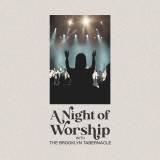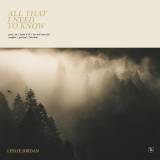The Mysterious Impact of Music & Song
What is it with Christians and music?
In ordinary American life, there are very few places other than church where we sing songs with a large group of friends and strangers.
Psalm 96 begins:
Sing to the Lord a new song;
sing to the Lord, all the earth.
Sing to the Lord, praise his name;
proclaim his salvation day after day.
sing to the Lord, all the earth.
Sing to the Lord, praise his name;
proclaim his salvation day after day.
Declare his glory among the nations,
his marvelous deeds among all peoples.
his marvelous deeds among all peoples.
For great is the Lord and most worthy of praise;
he is to be feared above all gods.
he is to be feared above all gods.
This Psalm is a song about singing. It exhorts us to tell the story of God and his salvation in song. It’s a fascinating Psalm to me because it talks about singing about God’s work among the nations and all the peoples—it’s about singing our way out into the world so that the world will know God.
Does singing have a specific power? Or is this just poetic language?
Consider ThisWhen God brings his people out of Egypt into the Promised Land to defeat Jericho, he has them circle the walls and sing until the walls fall down. That is when they are finally able to fully enter the land God had promised. Similarly, we see that singing is important in the story of Paul and Silas. In the midst of their suffering in prison, they sing to God, and it has a clear impact on the situation and on those around them.
Maybe there is something about singing about the glory of God, singing our way into the nations, and singing that others might know God that’s actually mysteriously and mystically powerful.
If music is truly important, then it’s worth pausing to reflect and think more deeply about it. In fact, when we study music we find that it is more complex, purposeful and nuanced that we may have originally thought.
Here is a brief list of different types of music that play various roles in our lives and the life of the church.
Comfort music starts when we’re young. Before we even know what music is, our mothers sing lullabies to help us sleep. It’s not just about the message, but the soothing quality of the musical tones. As we grow older certain songs and sounds take on a special quality as we experience them in different times in our lives. After those experiences, the songs stay with us and offer comfort for the rest of our lives.
Unity Music is music that identifies a group. It’s the national anthem, a school or university fight song, or other song that allows people to unite under one symbolic piece of music. We see this with soldiers, as well, who sing as they go through their many exercises. The music unites them and carries them along.
Protest Music has played a role in many freedom and activist movements. Think about the Vietnam protests or the anti-apartheid movement in South Africa. Most freedom movements through history have songs that accompanied them and that simultaneously played a role in helping unify those standing together in righteous protest.
Educational Music helps us remember things. Isn’t it amazing how learning history put to song helps us remember long lists of facts? Hymns were also written as educational pieces of music to help us learn deep, theological truths and the stories of God and salvation. Many were written coming out of the Reformation for a largely illiterate class of Christians who weren’t able to read the Bible on their own. The reformers had a high view of the mind and wanted to make sure that when Christians were singing, they (and we) were saturating their minds with theological truth that carried into their daily lives.
Experiential Music is a more modern form of music. For example, consider modern praise songs contrasted to classic hymns. They don’t talk as deeply about theology, but are more about saying, “God, I want to know you.” The Psalms are replete with songs directed to God in a very personal manner. Depending on your personality and upbringing, you may prefer traditional Christian hymns or more experiential modern-day hymns (praise songs). Neither is wrong; they are different forms of music that we can engage and enjoy.
Celebration Music might be the most fun. In Exodus 15 we read the story of how God leads the people across the Red Sea. Now that they can fully experience their freedom, song breaks forth in the Song of Moses & Miriam. All throughout Scripture there are times when God delivers his people, and the natural, fitting end to that is for them to sing praises to the God who has intervened on their behalf. As C.S. Lewis said, “We delight to praise that which we enjoy.” The praise is not different than the enjoyment; it’s actually the consummation of the enjoyment. The singing isn’t a separate act; it’s both the outgrowth of and expression of our joy.
Music of Lament is easily overlooked. We have a whole book of the Bible on this in Lamentations. These songs give a new tone to life and our experience. Often we can’t fully grapple with the suffering, loneliness, and brokenness of the world unless there is this music of lament that helps us feel and process our pain. The Blues is a whole musical genre that, among other things, grew out of and gave voice to shared suffering, existential loneliness, and despair.
Remembrance Music is also important to our faith. Psalm 121, a Psalm of Ascent begins, “I lift up my eyes to the mountains—where does my help come from? My help comes from the Lord, the Maker of heaven and earth.” This psalm would have been used when a family was on their way to Jerusalem for a remembrance festival. The journey was an upward journey that offered a view of the hills where the Ark of the Covenant had recently returned. These Psalms help us remember the role God has played in delivering us and when we look at our own problems today, we are reminded that God will have to play a role in delivering us, as well.
So what is it with Christians and singing?
When we examine it, we see there is a reason for it, and there is great depth to it. Once we know this, we’re confronted with the choice of entering into the music—or not. Watching people sing karaoke has taught me something: singing is ultimately a choice. It’s not usually about the song or the singer; it’s about the choice of entering into an experience with others.
Entering into music is a choice. Entering into worshiping God with the body of Christ has a great history,gravitas, and impact—and it’s our choice whether or not to fully participate.
May we choose to celebrate, remember, and pursue God through the corporate discipline of Christian praise and worship.
Originally published in Worship Leader Jan/Feb, 2015)
Originally published in Worship Leader Jan/Feb, 2015)
Ken Wytsma is a leader, innovator, author, social entrepreneur, and president of Kilns College where he teaches courses on philosophy and justice. He is the founder of the Justice Conference—an annual international conference that introduces men and women to a wide range of organizations and conversations relating to biblical justice and God’s call to give our lives away. kenwytsma.com
The Mysterious Impact of Music & Song
![The Mysterious Impact of Music & Song]() Reviewed by Admin
on
6:21:00 PM
Rating:
Reviewed by Admin
on
6:21:00 PM
Rating:
















Post a Comment